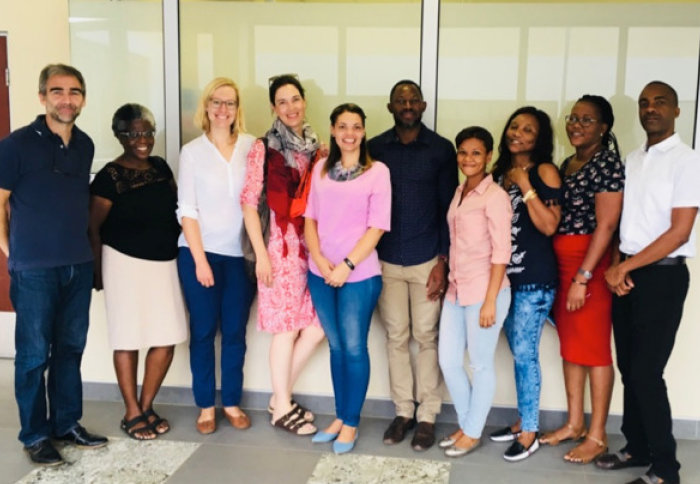£795k award supports new African research partnership tackling drug-resistant TB

Dr Mareli Claassens (fourth from left) and fellow researchers at the University of Namibia
The funding, awarded as part of the MRC/DFID African Research Leader scheme, brings together researchers from Imperial and the University of Namibia.
Imperial’s Dr James Seddon will oversee a five-year project in partnership with Dr Mareli Claassens at the University of Namibia. The research will focus on using whole genome sequencing and social networking analysis to identify where transmission occurs between individuals with multidrug-resistant tuberculosis (TB).
The scheme, jointly funded by the UK Medical Research Council and the UK Department for International Development, aims to strengthen research leadership across sub-Saharan Africa by attracting and retaining talented individuals who will lead high-quality programmes of research on key global health issues pertinent to the region. Emerging African research leaders are nominated and supported by a UK-based partner.
Fighting the multidrug-resistant TB epidemic
Each year, over half a million individuals develop multidrug-resistant TB, a form of the disease which is caused by organisms that are resistant to the most effective anti-TB drugs, rifampicin and isoniazid. Although these cases represent only 5% of the global TB burden, multidrug-resistant TB can consume over 50% of the TB budget in many high-burden countries and is a major threat to plans to eliminate the disease. To prevent ongoing transmission, infectious cases must be identified early, diagnosed and treated.
Led by Dr Seddon and Dr Claassens, researchers will work in two regions of Namibia over two years, identifying all multidrug-resistant TB cases that are diagnosed. The team will carry out whole genome sequencing on samples from individuals to evaluate relatedness and transmission dynamics. They will also contact and interview the patients, collecting clinical, epidemiological and social network data. Following this, researchers will combine whole genome sequencing and social network data to identify geographical sites where transmission could take place, potential ‘transmission hotspots.’
The team will then carry out feasibility studies to evaluate three methods of active case-finding, one of which will be the hotspots technique. This stage will involve undertaking qualitative research, in which patients and staff are interviewed to find out how acceptable the interventions are, as well as quantitative research, which will measure the proportion of cases that are identified and how much the activities cost.
Finally, researchers will use mathematical models to determine the potential impact on the national burden of multidrug-resistant TB if different strategies for case finding were employed, as well as their respective cost and cost-effectiveness.
Far-reaching benefits
Commenting on the potential impact of the planned research, Dr Seddon said: “Identifying transmission hotspots not only gives a unique insight into the drug-resistant tuberculosis epidemic but could also potentially provide a novel and effective method of finding new cases that have not yet been identified.”
“This proposal will not only enable new scientific discoveries in a much-neglected field but will also support the professional development of a promising Namibian researcher and build much-needed research capacity in an emerging academic centre in Southern Africa.”
Dr Claassens added: “I am extremely excited to have this opportunity to collaborate with Imperial in Namibia, where the proportion of drug-resistant tuberculosis is second highest in the region according to a recent survey.”
“Through this project, we will be able to address important scientific questions applicable not only to Namibia but also to other high burden areas, while building local capacity and working together with the National Tuberculosis and Leprosy Programme and other stakeholders.”
Commenting on the wider significance of the award, Professor Maggie Dallman, Vice-President (International) at Imperial: “I am delighted to hear about this exciting new project with Namibia. We have many exciting examples of work between African countries and Imperial, and the College is keen to work with African partners to build long-lasting, sustainable links that will benefit everyone involved.”
“Over the last few years, the College has been working to deepen our networks across Africa and ensure that we are supporting talented young Africans. The project is an excellent example of this work.”
The project is set to commence in Namibia in April 2020.
Article supporters
Article text (excluding photos or graphics) © Imperial College London.
Photos and graphics subject to third party copyright used with permission or © Imperial College London.
Reporter
Ms Genevieve Timmins
Academic Services